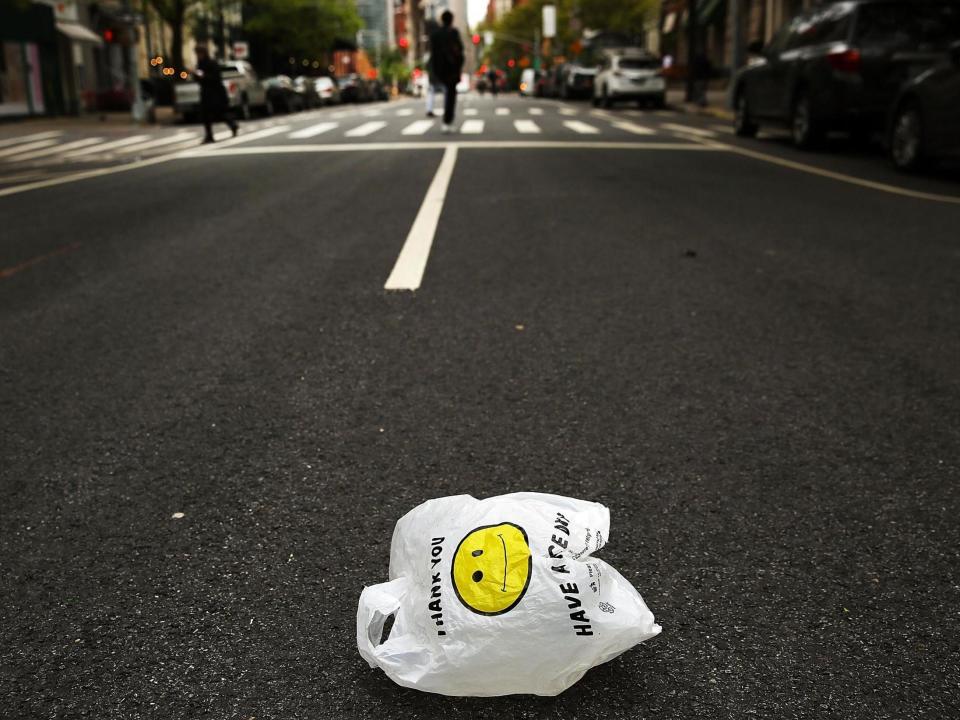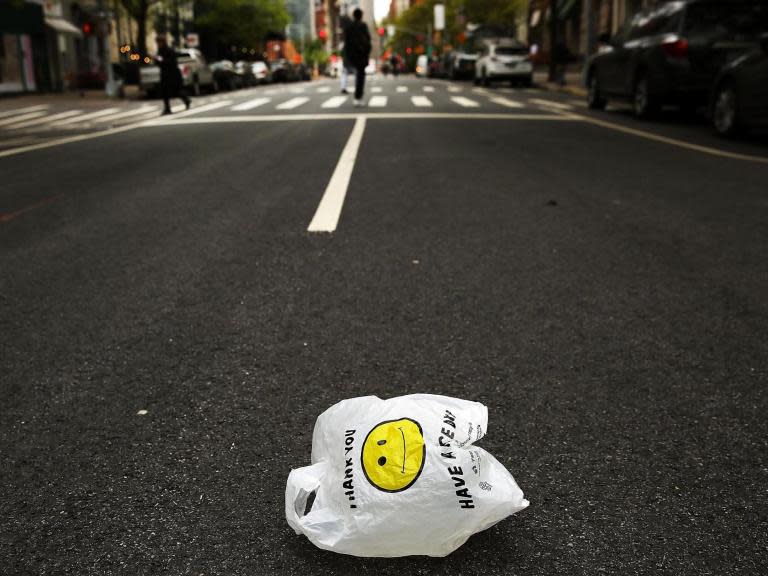New York City shoppers to be charged for paper bags in environmental crackdown
Attention, New York City shoppers: don’t think you’re going to easily avoid the statewide ban on plastic bags just by switching to paper ones.
Starting next year, those are also going to cost you 5 cents each.
When New York state lawmakers approved the ban on single-use plastic carryout bags – essentially ending the “paper or plastic?” quandary – they gave local governments the option to charge extra for paper alternatives.
The New York City Council has done just that, voting to tack on a nickel fee for each paper carryout bag a customer uses at retail and grocery stores.
The bill, approved Thursday in a 38-to-9 vote, came less than a month after New York became the second state, after California, to ban most plastic bags. Govenor Andrew Cuomo signed the plastic-bag ban into law during Monday’s celebration of Earth Day.
Environmental advocates applauded New York’s plan for curbing single-use plastic bags, but have said it could encourage shoppers to swap plastic for paper – essentially trading one form of waste for another.
The city’s legislation authorizing the 5-cent fee offers similar exceptions as the new state law, including an exemption for restaurant takeout bags. But lawmakers say the paper-bag fee is an important step in reducing overall waste.
And if the fee has its intended effect – encouraging people to change their shopping behaviour – most customers would not feel squeezed by the charge, Councilman Brad Lander said. “The goal is not to collect a single nickel,” said Lander, a Democrat from Brooklyn. “The goal is to help people bring reusable bags.”
The city’s Sanitation Department collects nearly 30,000 tons of paper bags every year, according to Belinda Mager, a spokeswoman.
The 5-cent fee will “ensure that clogged storm drains, polluted waterways and parkland riddled with non-biodegradable bag waste will be a part of New York City’s past,” Councilwoman Margaret S. Chin, a Democrat who represents Lower Manhattan and was one of the bill’s primary sponsors, said in a statement.
Mayor Bill de Blasio, who has expressed support for the 5-cent fee, still must sign the bill into law. It would take effect in March when the plastic-bag ban begins.
New York City will not be the only municipality with a paper-bag fee. Before the governor’s bill, the city of Long Beach and Suffolk County, both in Long Island, each implemented a fee on paper and plastic bags. Officials in Suffolk County said last month that their law, which went into effect in 2018, led to a massive reduction in plastic-bag use.
Ulster County also voted to adopt a paper bag fee, which is scheduled to take effect in July.
The legislation that passed Thursday was the latest step in a years-long effort to curb the use of carryout bags. The bag fee was first introduced in 2008 by former Mayor Michael Bloomberg, who eventually dropped the idea amid opposition.
Chin and Lander took up the cause years later, and in May 2016, the City Council narrowly voted to approve a 5-cent fee on both paper and plastic bags.
But a coalition of state lawmakers intervened, arguing the fee was a form of government overreach that would impose an undue financial burden on poor New Yorkers.
Mr Cuomo ultimately signed a bill to block the city’s fee in February 2017. At the time, he said the city’s law was “deeply flawed” because it would have allowed merchants to keep the fee as a profit.
The statewide bag bill championed by Mr Cuomo, a third-term Democrat, requires local governments that charge a paper-bag fee to use some of the revenue to provide free reusable bags to residents, especially those in lower-income communities. The rest of the money would go to the state’s Environmental Protection Fund.
Under New York City’s plan, 2 cents from every paper-bag fee would go towards boosting an existing initiative that has already provided close to 475,000 free reusable bags to city residents.
Mike Durant, president of the Food Industry Alliance of New York State, which represents grocery stores, said he was concerned that no money from the city’s paper bag fee would go to retailers, who could bear additional costs because of the policy.
Mr Durant said that city lawmakers failed to consider how a seemingly small fee can cut into profit margins.
“New York City’s cost of doing business is really high and can be onerous,” Mr Durant said.
Councilman Robert Holden, a Democrat from Queens who voted against the bill, said he worried the fee would put an undue burden on consumers as well.
“As if it wasn’t enough that we are taxed to death in every facet of our lives, the New York City Council has just passed another regressive tax,” he said in a statement.
The New York Times

 Yahoo News
Yahoo News 

